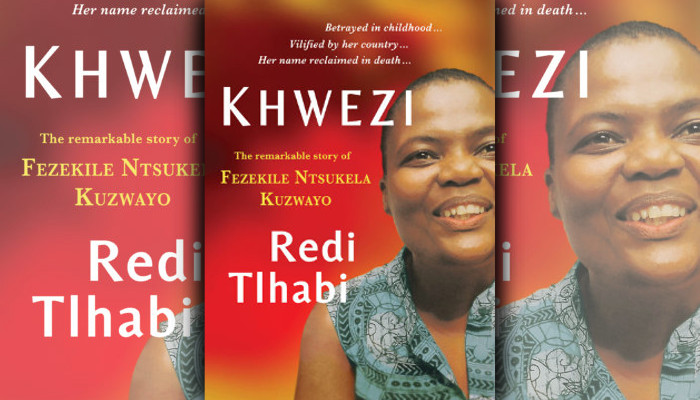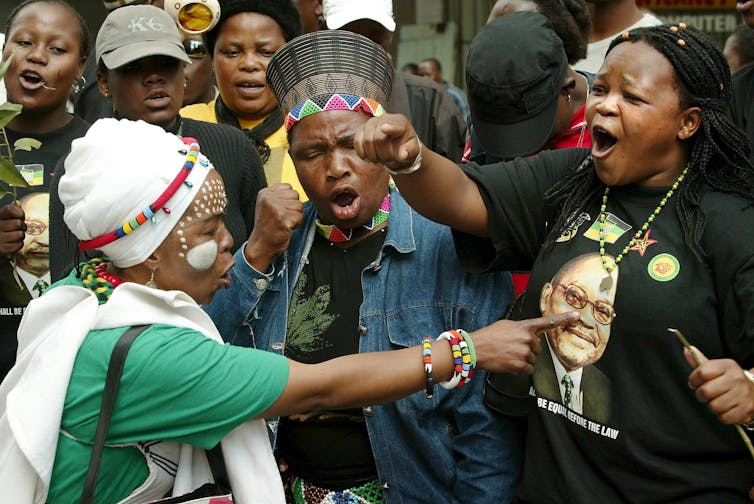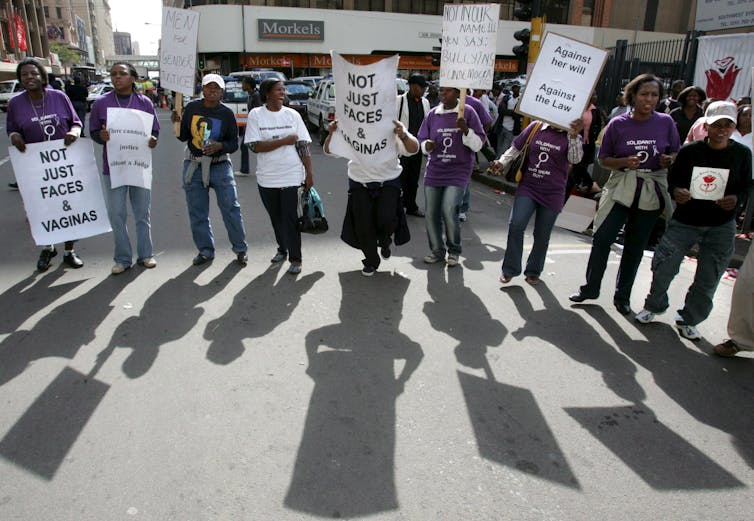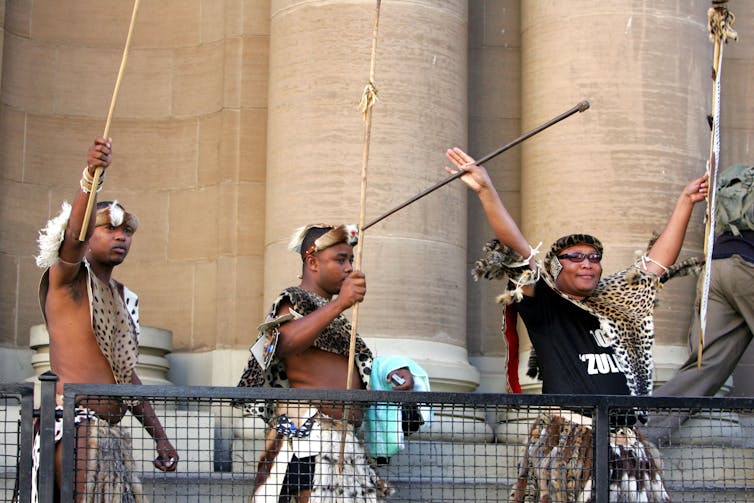Why, a decade on, a new book on Zuma’s rape trial has finally hit home
More about the book!

Shireen Hassim, University of the Witwatersrand
In 2007, barely a year after the man who went on to become South Africa’s president, Jacob Zuma, was acquitted on a charge of raping a young woman called “Khwezi” (the name given to Fezekile Ntsukela Kuzwayo during her rape trial), gender activist Mmatshilo Motsei published “The Kanga and the Kangaroo Court”. The book was an unsparing account of a society that allowed a prominent man to get away with acts of violence, of a criminal and justice system that was broken for the vast majority of those who were sexually abused, raped and tortured, and of a political system that had lost its compass.
Motsei was eminently qualified to write the book, as a survivor herself and as one of the pathbreaking group of activists who had begun the movement to end violence against women. Few read her book. Those that did were feminist activists and scholars who felt that she had given voice to their concerns, that she had released a collective howl from the gut.
Hardcore Zuma loyalists almost certainly did not read the book. Nevertheless they opened a new battlefront against Motsei, attacking her both publicly and privately.
Ten years later, broadcaster Redi Tlhabi has resurrected the story with her new book “Khwezi: The Remarkable Story of Fezekile Ntsukela Kuzwayo”. This time the public response has been very different. Record-breaking audiences have attended book launches. And radio conversations reveal a rapt public entirely consumed with the injustice done to Khwezi. The book sold out within weeks and is in reprint.
What has changed, many wonder? It is certainly not the story.

EPA
The story hasn’t changed
Kuzwayo’s story was first told in excoriating terms in 2006 by feminist academic Pumla Gqola. It was also told by Motsei and numerous academics analysing the violent condition of life for women and queer people in South Africa.
These accounts zeroed in on the shortcomings of the trial that allowed evidence that should not have been permissible, the social norms that denied women sexual desire and that demanded of women compliance with a patriarchal rendering of what constituted a rape-able person – certainly the child Khwezi, raped by at least one man in her community, was deemed to be consenting.
They exposed the almost complete inability of progressive organisations such as the African National Congress (ANC) and its tripartite allies, the South African Communist Party (SACP) and trade union federation Cosatu, to treat women and queer people as right-bearing members. All of these stories have been told, many times.
What’s different this time is that Tlhabi speaks into a South Africa that has changed. The pact of complicity that surrounded Zuma has broken. There are still those who are prepared to die for the “100% Zuluboy” as the T-shirts at the rape trial proclaimed. But they are no longer as powerful.
The tripartite alliance has fractured into innumerable feuding, chair-throwing, accusation-hurling bands of people without an ideological or moral centre. Zuma is now an acceptable target of vitriol. His endless Pyrrhic victories against those seeking to remove him from office have created a vast constituency of critics, not united by ideology, political affiliation or social identity but by a sense that something needs to change. It’s safe to hate on Zuma.
The moment does offer an opportunity, evident even to a jaded, cynical feminist. Tlhabi’s book has stepped into this political space with a clear-eyed argument about the small and everyday violations of women that make possible a culture of rape, “a war on women’s bodies”, to use Pumla Gqola’s terms.
Forthright style
Using her forthright style, and staking a reputation for honest and fair comment that was built over a long period as a host in talk radio, Tlhabi challenges South Africans to consider the violence that is normalised and invisible in human interactions. She invites people to consider everyday terms, she uncovers the assumptions behind legal terms, she shows readers how to read the discourses that underpin a rape culture.

EPA
In the trial, Zuma’s lawyers painstakingly presented Khwezi as a woman who was untrustworthy, inconsistent, hyper-sexualised and entirely to be dismissed. Tlhabi gives us Fezekile Ntsukela Kuzwayo: a likeable, funny, garrulous, trusting woman, a loyal if exasperating friend and a caring daughter, someone who was loved by her friends and comrades.
Her family was the ANC, to be sure, but it was also a collective of feminist friends (old and young) who held her through the worst nightmares of the trial and subsequent re-exile. She shows us how one rape, one abuse, leads to another, that this violence is part of a never ending cycle.
Tlhabi is at pains simultaneously to honour the particular biography of Fezeka, while reminding readers that Fezeka is every woman. She does this well, mapping the single story against a contextual landscape of statistics and historical patterns of violence against women.

EPA
Fezeka died, tragically and unexpectedly, just a year before the book was published. Her death, too early, is a dramatic end to the personal story. But the publication of the book gives her a public life that, perhaps, she might have felt valorised the experiences that the trial so powerfully cast as lies.
The real lies, of course, are political. Fezeka was let down over and over again by a movement that she loved and trusted. Some leaders – such as Communist stalwart and Zuma critic, Ronnie Kasrils – come out of this sorry story well. Most, however, do not.
‘Burn the Bitch’
Throughout the trial, while Zuma played to the rabble of supporters outside the court, the ANC leadership watched in silence. It was silent when he sang his archetypal phallic and violent anthem “Awuleth’ Umshini wam’” (Bring me my machine gun) outside the court room, and silent when members of the ANC carried banners saying “Burn the Bitch”.
And, perhaps, the leaders who were not silent were the most shocking. The ANC Women’s League mobilised actively against Fezeka both in public and in private. They were the storm troopers of patriarchy.
In 2007, unity in the ANC was mobilised against truth and justice. Cosatu and SACP leaders and activists thought that the rape trial was a distraction from the “real” issue of “returning the ANC to the branches”. “One fool at a time,” to coin Fezeka’s favourite line, the ANC and its allies fell behind Zuma.

Mike Hutchings/Reuters
And no opposition political party offered meaningful support to Fezeka, happy perhaps to leave this dysfunctional family of the ANC to disintegrate.
What’s changed
South Africa has changed. In the wake of the trial, a new and assertive feminist movement seeded and grew. It began with the women’s rights organisation, “One in Nine”, formed expressly to support Fezeka, and has ballooned well beyond that.
Its daughters are everywhere – the four young women who held up banners during a Zuma speech at the Independent Electoral Commission in 2015, the queer black feminists on university campuses who are no longer prepared to tolerate violence in the name of unity, the artists and musicians and writers who are framing experiences in new ways. They too, are part of a new moment that makes possible a new conversation.
Yet. Yet. At least this reader, observing the hype surrounding the book, is still plagued by the question of who is listening, and what messages are being absorbed into South Africa’s political DNA. Will this book provoke the urgently needed attention to violence by the government, the police, the courts? Will people listening and reading ask themselves if they have enabled a culture of rape?
![]() It isn’t just Jacob Zuma who stands accused of rape, after all.
It isn’t just Jacob Zuma who stands accused of rape, after all.
Shireen Hassim, Professor of Politics, University of the Witwatersrand
This article was originally published on The Conversation. Read the original article.
Categories Non-fiction South Africa
Tags Fezekile Ntsukela Kuzwayo Jonathan Ball Publishers Khwezi Redi Tlhabi Shireen Hassim The Conversation
